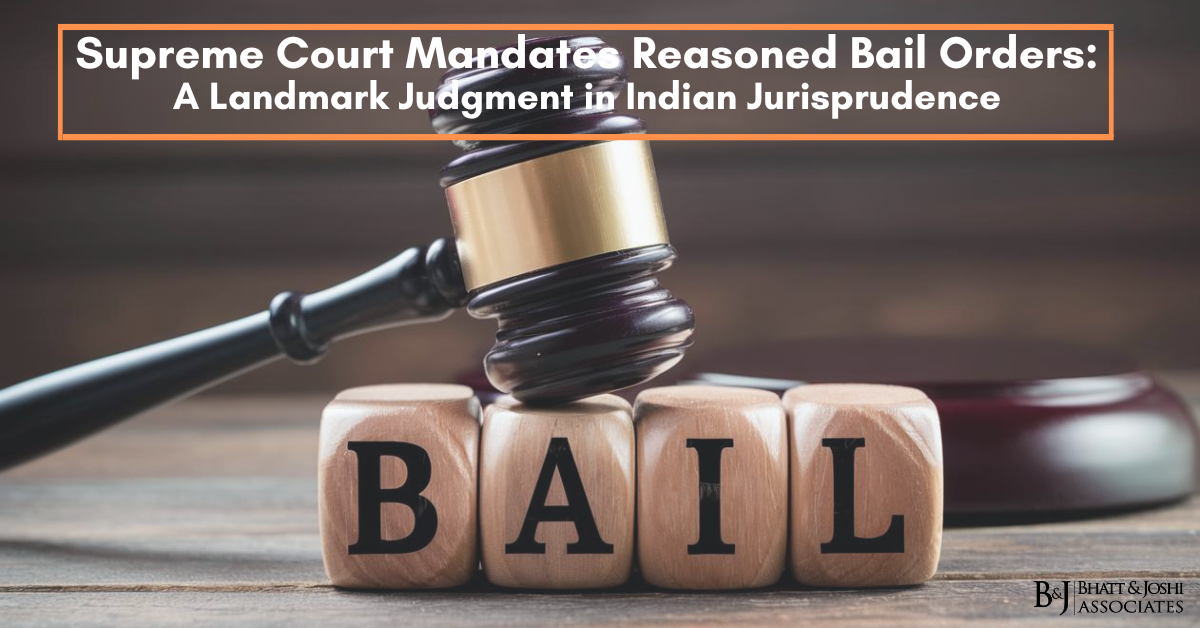Supreme Court Mandates Reasoned Bail Orders: A Landmark Judgment in Indian Jurisprudence

Introduction: The State of Jharkhand vs Anil Ganjhu
Background of the Case
The Criminal Charges
The case revolves around Anil Ganjhu, accused of serious offenses including:
- Murder (Section 302 of the Indian Penal Code)
- Kidnapping (Section 364 of the IPC)
- Destruction of evidence (Section 201 of the IPC)
Ganjhu, allegedly a member of an extremist organization called TPC operating in Jharkhand, was accused of forcibly abducting the victim from his home. The victim’s body was discovered days later, indicating a brutal murder.
The High Court’s Bail Order
The Jharkhand High Court granted bail to Ganjhu in an order dated April 26, 2023. However, this order was criticized by the Supreme Court for being “slip-shod” and lacking in detailed reasoning.
Key Aspects of the Supreme Court’s Judgment on Reasoned Bail Orders
1. Presumption of Non-Application of Mind
The Supreme Court established a crucial principle: when a bail order lacks reasons, there is a presumption that the court has not applied its mind properly. This presumption may necessitate intervention by higher courts.
2. Criteria for Well-Reasoned Bail Orders
The judgment outlines what constitutes a well-reasoned bail order:
- Detailed analysis of the case facts
- Consideration of the nature and gravity of the offense
- Assessment of the accused’s role
- Evaluation of the possibility of evidence tampering or witness intimidation
3. Balancing Act in Bail Decisions
The Court emphasized the need to balance:
- Personal liberty of the accused
- Public safety concerns
- Interests of the criminal justice system
4. Insufficiency of Generic Statements
The judgment clarifies that phrases like “having perused the record” or “on the facts and circumstances of the case” are insufficient. Judges must provide specific reasons for their decisions.
Implications of the Judgment
1. For Lower Courts and High Courts
- Increased scrutiny of bail orders
- Need for more comprehensive bail hearings
- Potential reduction in arbitrary bail decisions
2. For Legal Practitioners
- Requirement for more thorough bail applications
- Necessity to anticipate and address all relevant factors in bail hearings
3. For Accused Persons
- More rigorous consideration of bail applications
- Clearer grounds for appealing bail decisions
4. For Law Enforcement and Prosecution
- Enhanced ability to challenge unjustified bail orders
- Greater emphasis on presenting comprehensive arguments against bail in serious cases
The Supreme Court’s Directives
Remand to High Court
The Supreme Court set aside the Jharkhand High Court’s bail order and remitted the matter back for fresh consideration.
Time Frame for New Hearing
A specific directive was given to the High Court to hear the matter afresh and pass a new order within ten days of receiving the Supreme Court’s order.
The Supreme Court’s Directives on Bail Orders: Emphasizing Reasoned Decisions
1. Enhancing Judicial Accountability
This judgment reinforces the principle of open justice, ensuring that judicial decisions are not only fair but are seen to be fair.
2. Addressing Systemic Issues
- Potential reduction in frivolous appeals due to well-reasoned lower court orders
- Indirect approach to tackling pendency and delays in the judicial system
3. Judicial Training Implications
Highlights the need for ongoing training programs for judges, focusing on writing clear and well-reasoned orders.
Conclusion: A New Era in Bail Jurisprudence
The Supreme Court’s judgment in “The State of Jharkhand vs Anil Ganjhu” marks a significant milestone in Indian criminal law. By setting clear standards for bail orders, the Court has taken a crucial step towards ensuring more transparent, accountable, and just bail proceedings. This decision is likely to have far-reaching effects on the criminal justice system, potentially leading to more uniform and well-considered bail decisions across the country. As the legal community adapts to these new standards, the impact of this judgment will continue to shape bail proceedings and reinforce the fundamental principles of justice and fairness in the Indian legal system. It stands as a testament to the evolving nature of Indian jurisprudence and its commitment to upholding the highest standards of judicial reasoning and accountability.
 Whatsapp
Whatsapp

